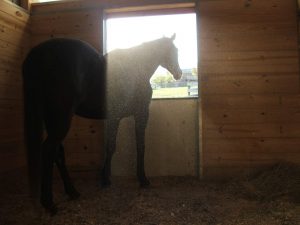
Making Winter Manageable on Horse Farms
Don’t wait for the first snowflakes to prepare your horse property for the cold, dark, and wet months ahead.

Don’t wait for the first snowflakes to prepare your horse property for the cold, dark, and wet months ahead.

One expert explains why closing your barn doors and windows during the winter might not be ideal for your horse’s health.

Poor air quality from wildfire smoke can be very dangerous for horses. An equine internal medicine specialist offers advice.

Learn how air quality issues such as wildfire smoke and pollution can affect your horse’s respiratory health.

Learn about the importance of air quality for your horse’s respiratory health from Oct. 16 – 21 on TheHorse.com.

Improving the air quality in your barn can protect horses and humans against respiratory dysfunction.

Researchers have determined that testing bronchoalveolar lavage fluid might be the most accurate way to diagnose horses with equine asthma.

Dietary adjustments might help horses with recurrent airway obstruction breathe better.

These practices will help minimize odors on your farm to keep you, your horses, and your neighbors healthy and happy.

Horses exposed to fire smoke can suffer respiratory injury; knowing what is normal can help you determine whether your horse might need veterinary attention.

If you house your horses in a barn, keeping it well-ventilated is an essential part of their care.

Keep dust to a minimum in arenas, barns, and paddocks for both aesthetic and health reasons.

8 important tasks to check off your list before the colder weather arrives.

A veterinarian gives tips for creating your own equine facility with horse health in mind.

Consider these horse health- and safety-oriented design aspects when building or renovating your barn.

Find resources on using management strategies to keep your horses healthy during the week of Aug. 1 on TheHorse.com.
Stay on top of the most recent Horse Health news with
© 2022 Copyright Statement dolor sit amet, consetetur sadipscing User Terms, sed diam nonumy eirmod tempor invidunt ut labore et dolore magna aliquyam erat, sed diam voluptua. At vero eos et accusam et justo duo dolores et ea rebum. Stet clita kasd gubergren, no sea takimata sanctus est Lorem ipsum dolor sit amet.
"*" indicates required fields